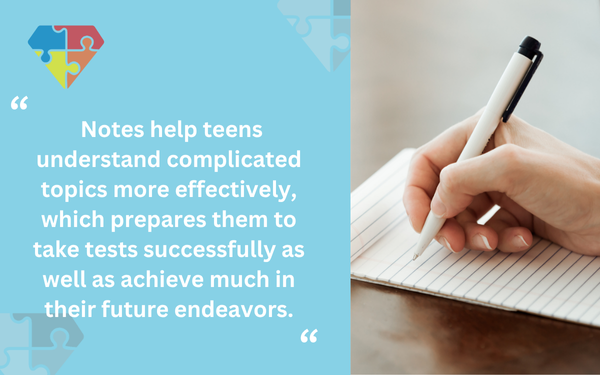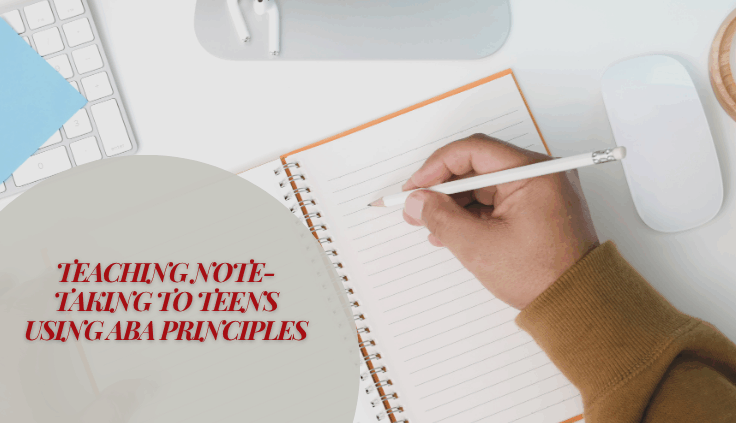Teaching Note-Taking to Teens Using ABA Principles
Applied behavior analysis, or ABA therapy, is an evidence-based approach to learning that helps children with autism spectrum disorder (ASD) build new skills and modify certain behaviors. While it’s often considered an early intervention method that works best for young children, it also can play a critical role in teaching teens with autism practical school, work and life skills.
All teens go through transformative change and unique challenges as they enter adolescence. These changes and challenges can present extra difficulties for teens with autism, who are already facing obstacles associated with their neurodevelopmental disorder.
This can cause teens on the autism spectrum to have trouble interacting with their peers, and can even affect their educational achievements. In many ways, ABA therapy can help to support teens with autism going through these challenging times.
In this article, we’ll take a look an important aspect of the educational experience for teens — note taking, and how ABA principles can help teach this critical skill.
Table Of Contents
Why is Note-Taking Important for Teens?
Note-taking skills may seem trivial, but it plays an important role in the overall development of teens — both in their academic careers and everyday lives.
Learning how to take notes properly can not only boost a teen’s academic performance but also enhance their overall learning and improve their memory. Notes help teens understand complicated topics more effectively, which prepares them to take tests successfully as well as achieve much in their future endeavors.

Note-taking is a form of active learning. Instead of just absorbing information in a passive way, it forces them to play an active role in it, which promotes a deeper understanding of the concepts being taught.
When children write information down, it also helps them remember it better in the future. This enhanced recall ability can improve their test-taking results as well as their ability to apply the concepts they learn in class to real-world scenarios.
This results in better overall comprehension of what’s being taught, and a generalization of the skills, which is the ultimate goal of education to begin with.
So, while note-taking is mostly associated with test preparation, it also has many practical life applications as well.
How Can ABA Therapy Teach Note-Taking to Teens?
ABA therapy follows many of the same strategies for teens as it does for young children with autism. The difference is that these strategies, tools and approaches are adjusted to meet the child where they’re at, which helps them meet their goals more effectively.
A key focus for ABA therapy when it comes to note-taking is teaching organizational skills. The ability to get and maintain organization is critical for successful note taking.
This can be taught through task analysis, which breaks complex tasks into smaller and more manageable steps for teens with autism. By teaching individual aspects of note-taking one at a time — and only moving to the next step once the one before it is mastered — it helps to reduce stress and anxiety associated with taking notes, promoting independence and confidence in the process.
ABA therapists will also use personalized prompts and visual aids to teach the fundamental skills of note taking. Prompts will serve as indicators that it’s time to do something, while visual aids will help to teach the skills in a way that’s more customized to the style of learners that teens with autism often are.
They will also integrate positive reinforcement into the therapy plan, rewarding the teen when they successfully complete certain tasks. This could come in the form of extra verbal praise, set time where they can do an activity they love or even some extra screen time once they’ve finished a task.
By incorporating parents, caregivers, teachers and other family members into the process, ABA therapists can help teens generalize these skills so that they can use them in practical ways across multiple environments.
Consistency in approach and rewards is essential for long-term ABA therapy success. This takes the involvement of the people who spend the most time with the teen, since ultimate success is determined by the ability to exhibit the skills and behaviors taught in therapy sessions throughout their lives.
Teens with Autism Can Learn Practical Skills at Blue Gems ABA
Note-taking is a vital skill that teens need to build and grow. It leads to success in educational environments and supports improvement in memory and overall learning.
At Blue Gems ABA, our experienced therapy team crafts personalized treatment plans that cater to the unique strengths, challenges and preferences of teens with autism. We can help them build these essential note-taking skills as well as other skills and behaviors that can support them living as independently as possible.
To learn more, please contact us today.




